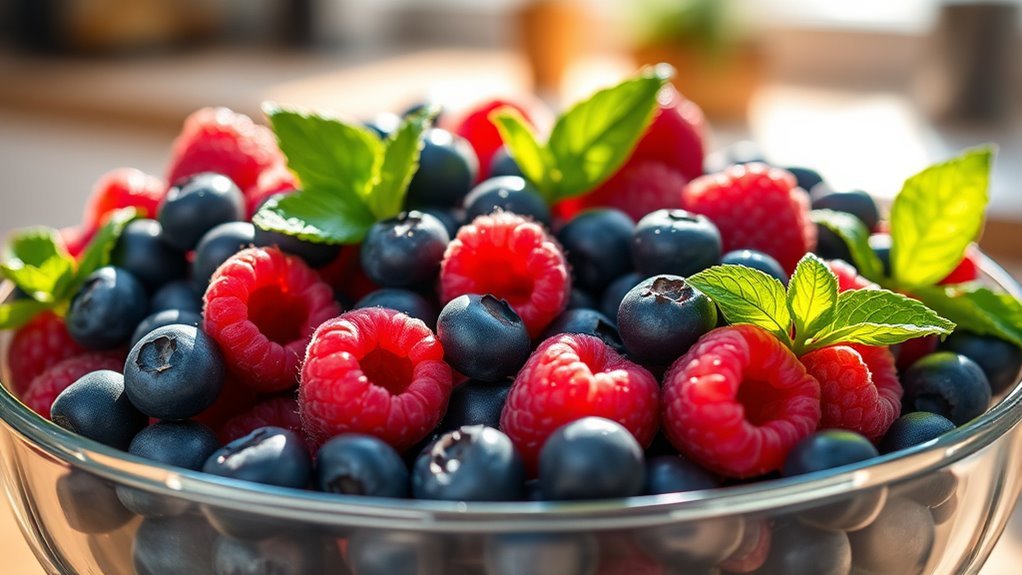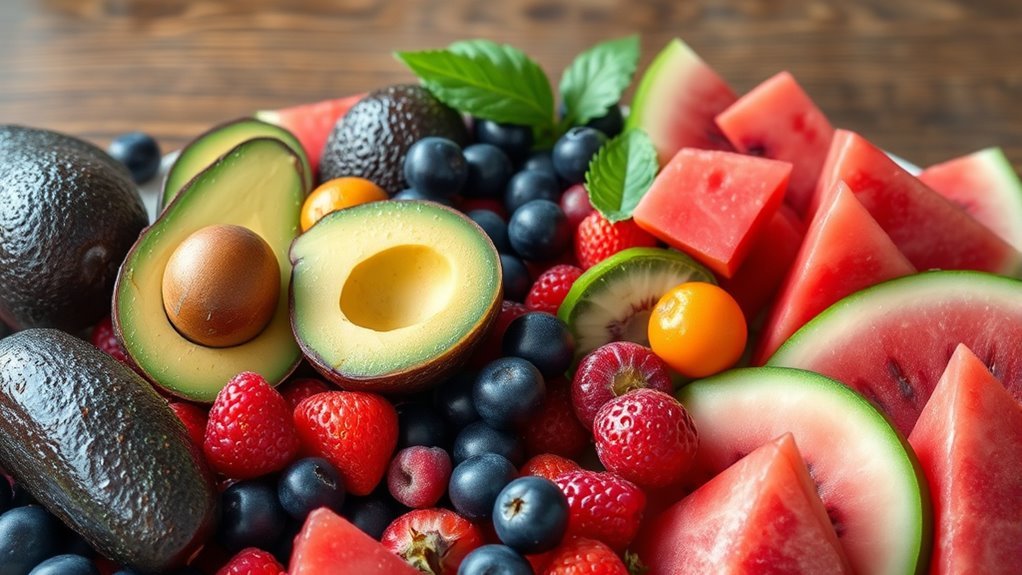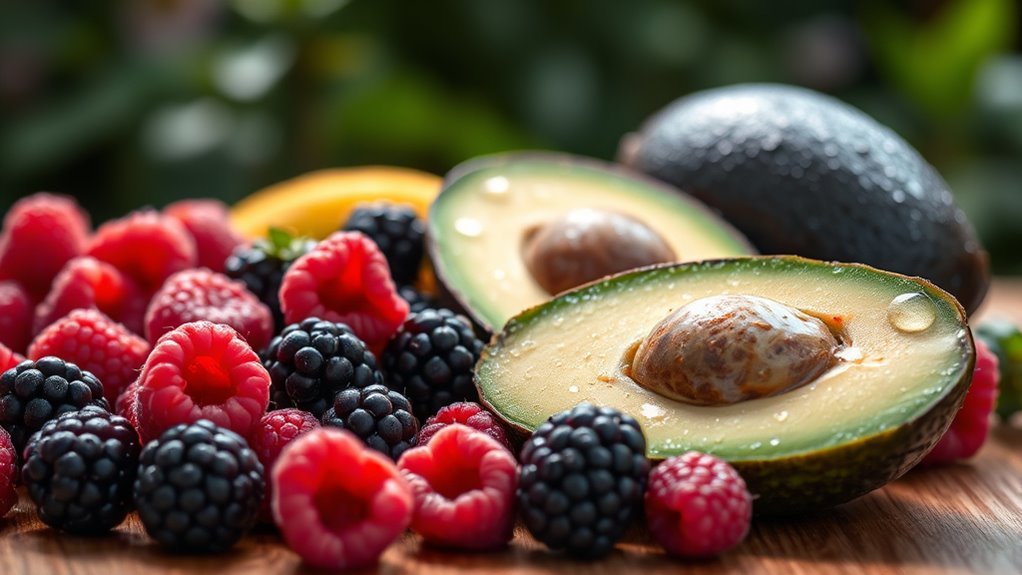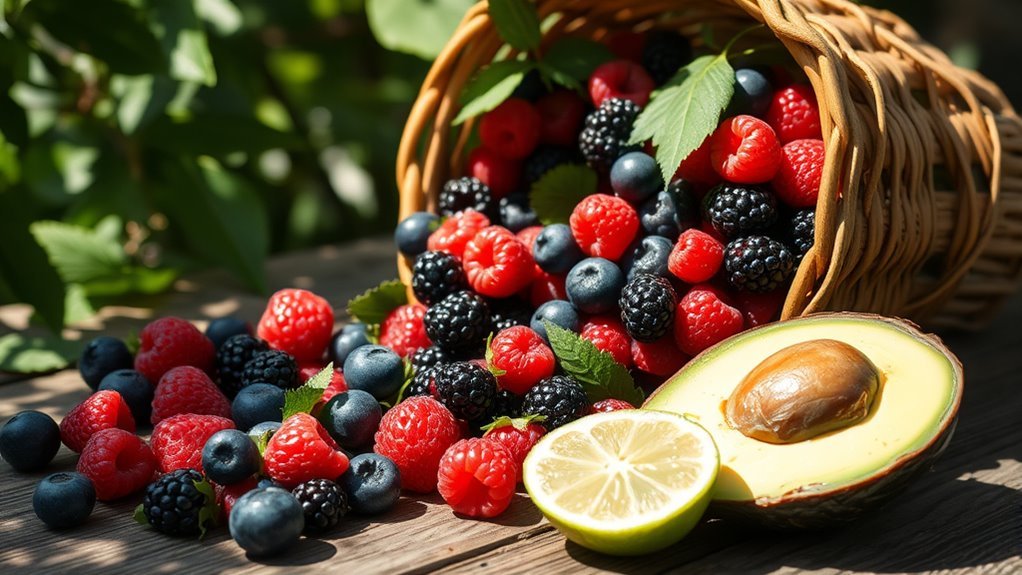Yes, you can eat fruit on a keto diet, but it’s crucial to choose wisely. Low-carb fruits like berries, avocados, and lemons fit well into your carb limits. Remember to monitor portion sizes to stay within your daily carb allowance of 20-50 grams. Some fruits can spike blood sugar, so opt for those with a lower glycemic index. There are many ways to enjoy fruit while maintaining ketosis, and you’ll discover more tips ahead.
Understanding the Keto Diet and Carbohydrate Limits

When you immerse yourself in the keto diet, it’s vital to understand its fundamental principles, especially regarding carbohydrate limits. The keto basics emphasize a significant reduction in carb intake, typically to around 20-50 grams per day. This carb restriction helps your body enter a state of ketosis, where it burns fat for fuel instead of carbohydrates. Understanding this balance is essential for achieving your health goals without feeling restricted. While you might crave certain high-carb foods, knowing how to manage your intake allows for more freedom in your choices. Focusing on low-carb options such as leafy greens and healthy fats can keep you satisfied while adhering to keto guidelines, empowering you to take control of your dietary journey.
The Nutritional Profile of Fruits

Fruits are often celebrated for their vitamins, minerals, and antioxidants, making them a staple in many diets. However, their sugar content varies widely across fruit types, influencing your choices on a keto diet. Here’s a quick look at some common fruits and their nutritional profiles:
| Fruit Type | Sugar Content (grams per 100g) |
|---|---|
| Strawberries | 7.7 |
| Blueberries | 10.0 |
| Apples | 10.4 |
| Avocado | 0.7 |
Understanding the sugar content helps you enjoy fruit while maintaining your keto goals. While some fruits are higher in sugar, others, like avocados, can fit seamlessly into your low-carb lifestyle.
Low-Carb Fruits You Can Enjoy

Although many fruits are high in sugar, there are still plenty of low-carb options that can satisfy your cravings without derailing your keto diet. Berries, such as strawberries, raspberries, and blackberries, are great choices, offering antioxidants while being low in carbs. Avocado, a unique fruit, is also low in sugar and high in healthy fats, making it perfect for keto. Watermelon and cantaloupe are hydrating fruits that can refresh you during warmer months, and they offer a moderate carb count. Don’t forget about seasonal fruit, like rhubarb or cherries, which can add variety to your diet. Enjoy these options in moderation to maintain your balance while still indulging in delicious flavors.
The Impact of Sugar in Fruits on Ketosis
Even with the enjoyment of low-carb fruits, it’s important to understand how the sugar content can affect your state of ketosis. Fruits contain different sugar types, primarily fructose and glucose, which can vary in their impact on your blood sugar levels. The fruit glycemic index (GI) helps gauge how quickly these sugars enter your bloodstream, influencing insulin response. High-GI fruits can spike your blood sugar, potentially knocking you out of ketosis. Conversely, low-GI fruits like berries may have a lesser effect, allowing you to enjoy them in moderation. Ultimately, being mindful of the sugar content in fruits can empower you to maintain your keto lifestyle without feeling deprived. Balance is key!
Portion Control: How Much Fruit Can You Have?
When following a keto diet, portion control is essential, especially with fruits that contain natural sugars. Opting for low-carb fruit options like berries can help you enjoy some sweetness while staying within your carb limits. Understanding serving size guidelines can further guarantee you maintain your ketosis without sacrificing flavor.
Low-Carb Fruit Options
While you might think that following a keto diet means saying goodbye to all fruits, there are actually some low-carb options that can fit into your meal plan. Berries, such as strawberries, raspberries, and blackberries, are great choices due to their lower sugar content. Avocados, though often overlooked, are technically fruits and are packed with healthy fats. When considering fruit pairings, combining these options with nuts or cheese can enhance flavor while keeping carbs in check. Seasonal fruits like watermelon or cantaloupe can also be enjoyed in moderation. Just remember, portion control is key, so you can enjoy these low-carb fruits without derailing your keto goals. Embrace the freedom to incorporate these tasty options wisely!
Serving Size Guidelines
Understanding serving size guidelines is essential for successfully incorporating fruit into your keto diet. To maintain ketosis, aim for low-carb fruits and be mindful of your portion sizes. A typical fruit serving, like half a small avocado or a handful of berries, can fit into your daily carb allowance. Portion guidelines suggest limiting fruit intake to about 20-30 grams of net carbs per day for keto dieters. This means you can enjoy a small serving of fruit while still prioritizing low-carb foods. It’s all about balance—satisfy your cravings without derailing your progress. Keeping track of your fruit servings helps you enjoy the freedom of variety while adhering to your keto lifestyle.
Health Benefits of Eating Fruit on Keto
Eating fruit on a keto diet can actually provide some valuable health benefits. Many fruits are packed with essential nutrients, antioxidants, and fiber, which can support your overall well-being. By choosing low-carb fruits in moderation, you can enjoy these advantages without compromising your keto goals.
Nutrient Density Benefits
Although the ketogenic diet typically emphasizes low-carb foods, incorporating certain fruits can provide significant nutrient density benefits that enhance overall health. Fruits like berries, avocados, and tomatoes are low in carbs yet high in essential vitamins, minerals, and antioxidants. This nutrient density can support your immune system, improve skin health, and promote better digestion. By choosing these fruits wisely, you can enjoy the health benefits without compromising your keto goals. They offer a natural source of hydration and can satisfy sweet cravings, making your dietary journey more enjoyable. Balancing your fruit intake with your overall carb count allows you the freedom to enjoy these nutrient-rich foods while still reaping the advantages of a ketogenic lifestyle.
Antioxidants and Fiber
Incorporating fruit into your keto diet can offer valuable health benefits, particularly through antioxidants and fiber. Fruits like berries, avocados, and tomatoes are excellent sources of antioxidants, which help combat oxidative stress and inflammation in your body. These antioxidant benefits can support overall health and potentially reduce chronic disease risks. Additionally, fruits provide important fiber sources, which are vital for digestive health. Fiber aids in maintaining regularity and can help you feel fuller for longer, making it easier to stick to your keto goals. While it’s important to watch your carb intake, enjoying low-sugar fruits in moderation allows you to reap these benefits without derailing your diet. Balance is key, and choosing the right fruits can enhance your keto experience.
Creative Ways to Incorporate Fruit Into Your Meals
While many might think fruits are off-limits on a keto diet, there are creative ways to enjoy them without derailing your carb intake. Consider blending a few berries into fruit-infused smoothies for a revitalizing breakfast or snack. You can also experiment with fruit-based desserts using low-carb ingredients, like almond flour or coconut cream, to satisfy your sweet tooth.
Here are some keto-friendly fruit options to inspire you:
| Fruit | Serving Size | Net Carbs (g) |
|---|---|---|
| Raspberries | 1 cup | 7 |
| Strawberries | 1 cup | 8 |
| Blackberries | 1 cup | 6 |
| Avocado | 1 medium | 2 |
| Lemons | 1 medium | 5 |
Enjoying fruit on keto can be both fun and satisfying!
Common Misconceptions About Fruit on a Keto Diet
When it comes to fruit on a keto diet, many people misunderstand its carb content and nutrient density. You might think all fruits are off-limits due to their sugar levels, but some can actually fit into your daily carb allowance. Understanding the facts can help you make informed choices about which fruits to include in your meals.
Carb Content Misunderstandings
Many people assume that all fruits are off-limits on a keto diet due to their carbohydrate content, but this belief oversimplifies the issue. Not all fruits have the same impact on your body. The fruit glycemic index varies widely, meaning some fruits can fit into your keto adaptations without spiking your blood sugar. For instance, berries like strawberries and raspberries are lower in carbs and high in fiber, making them more keto-friendly options. It’s important to focus on portion control and choose fruits wisely, as even small amounts can add up. Embracing the right fruits can enhance your diet, providing essential nutrients while still allowing you the freedom to enjoy nature’s sweets.
Nutrient Density Misconceptions
How often do you consider the nutrient density of fruits when following a keto diet? Many think fruit is off-limits, but understanding nutrient timing can help you make better choices. Here are some common misconceptions:
- All fruits are high in sugar – Some fruits, like berries, are lower in sugar and can fit into a keto plan.
- Fruit alternatives are always better – Not all substitutes provide the same vitamins and minerals.
- Nutrient density doesn’t matter – Nutrient-rich fruits can support your health, even on keto.
- You can’t enjoy fruit at all – With mindful choices, you can enjoy fruits like avocados and olives, which are keto-friendly.
Embrace the freedom of selecting the right fruits for your diet!
Tips for Selecting the Right Fruits
While you might think all fruits are off-limits on a keto diet, selecting the right ones can actually enhance your meals without knocking you out of ketosis. Here are some fruit selection strategies to help you enjoy seasonal fruit choices while staying keto-friendly:
| Fruit | Net Carbs (per 100g) | Season |
|---|---|---|
| Avocado | 2g | Year-round |
| Raspberries | 5g | Summer |
| Blackberries | 5g | Summer |
| Strawberries | 6g | Summer |
| Lemons | 6g | Year-round |
Tracking Your Macros With Fruits in Your Diet
Understanding how to track your macros when incorporating fruits into your keto diet is essential for maintaining ketosis. With keto flexibility, you can enjoy fruits while staying within your limits. Here’s how to make fruit tracking easier:
- Know Your Limits: Understand your daily carb allowance and how much fruit fits in.
- Choose Wisely: Opt for low-carb fruits like berries, which provide nutrients without too many carbs.
- Portion Control: Measure your servings to avoid overindulgence; even healthy fruits can add up.
- Use Apps: Consider tracking apps to log your fruit intake and monitor your macros effectively.
1. Can you eat any fruits on a keto diet?
Yes, you can eat certain fruits on a keto diet, but it’s essential to choose low-carb options. Fruits like berries (strawberries, raspberries, and blackberries) are generally lower in carbohydrates compared to others. Avocados, although technically a fruit, are also an excellent choice due to their high healthy fat content and low carb count. However, fruits like bananas, grapes, and apples tend to be higher in sugar and carbs, making them less suitable for a strict keto diet.
2. How many carbs can you consume from fruits on keto?
The amount of carbs you can consume from fruits while on a keto diet varies depending on your individual carb limit, which typically ranges from 20 to 50 grams of net carbs per day. To stay within this limit, it’s crucial to monitor the carb content of the fruits you choose. Ideally, you should aim to keep fruit consumption to around 5-10% of your total daily carbs, focusing on low-carb fruits and being mindful of portion sizes.
3. Are dried fruits allowed on a keto diet?
Dried fruits are generally not recommended on a keto diet due to their high sugar content and concentrated carbohydrates. When fruits are dried, their water content is removed, leading to a higher density of sugars and carbs. For example, a small amount of dried raisins or apricots can contain a significant number of carbs that could easily exceed your daily limit. It’s best to avoid dried fruits or consume them in very small quantities if you’re following a strict keto regimen.
4. What are some keto-friendly fruit alternatives?
If you’re looking for keto-friendly fruit alternatives, consider options such as berries (strawberries, blueberries, and raspberries), which are lower in carbs. Other great choices include avocados, olives, and tomatoes. Additionally, you can substitute fruit with keto-friendly snacks like nuts, seeds, and vegetables that have a naturally sweet flavor, such as bell peppers or cherry tomatoes, to satisfy cravings without exceeding your carb limit.
5. How can I incorporate fruits into my keto diet without going over my carb limit?
To incorporate fruits into your keto diet while staying within your carb limit, start by selecting low-carb fruits like berries and avocados. Measure your portions carefully; for example, a half-cup of raspberries contains about 3.5 grams of net carbs. Pair fruits with high-fat foods like cream or nuts to enhance satiety and help stabilize blood sugar levels. Planning your meals and tracking your carb intake using apps can also help you maintain control and enjoy fruits in moderation.
References
- https://www.healthline.com/nutrition/keto-diet-fruits
- https://www.dietdoctor.com/low-carb/fruits
- https://www.ncbi.nlm.nih.gov/pmc/articles/PMC5527065/
- https://www.webmd.com/diet/what-is-the-keto-diet
- https://www.medicalnewstoday.com/articles/319764
- https://www.mayoclinic.org/healthy-lifestyle/nutrition-and-healthy-eating/expert-answers/keto-diet/faq-20465861
- https://www.cdc.gov/healthyweight/healthy_eating/fruits.html
- https://www.verywellfit.com/what-fruits-are-keto-friendly-5191682


